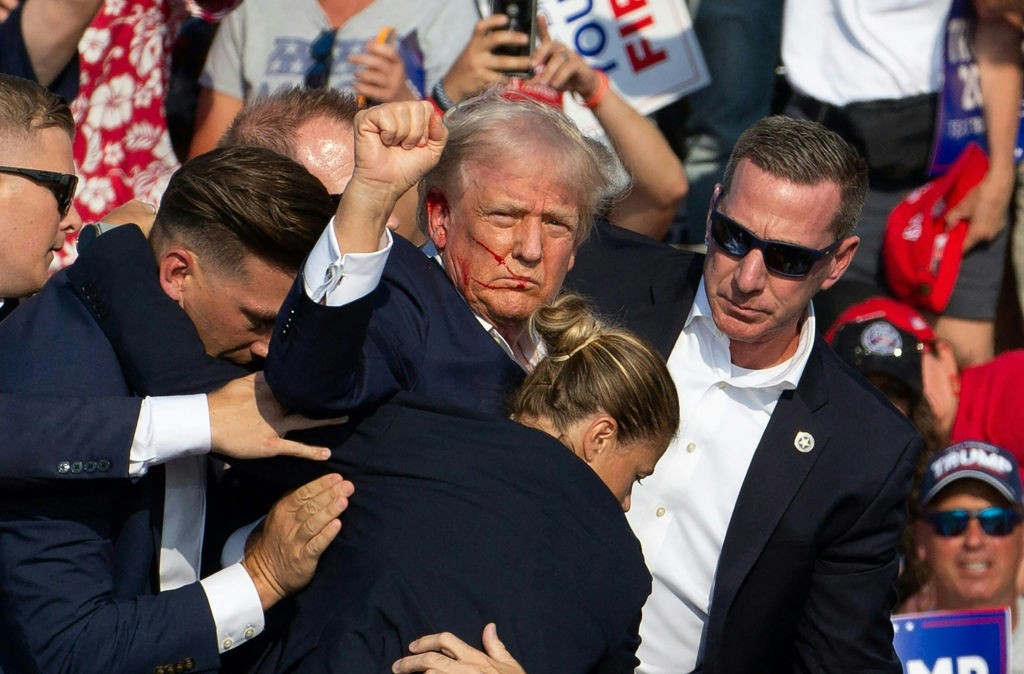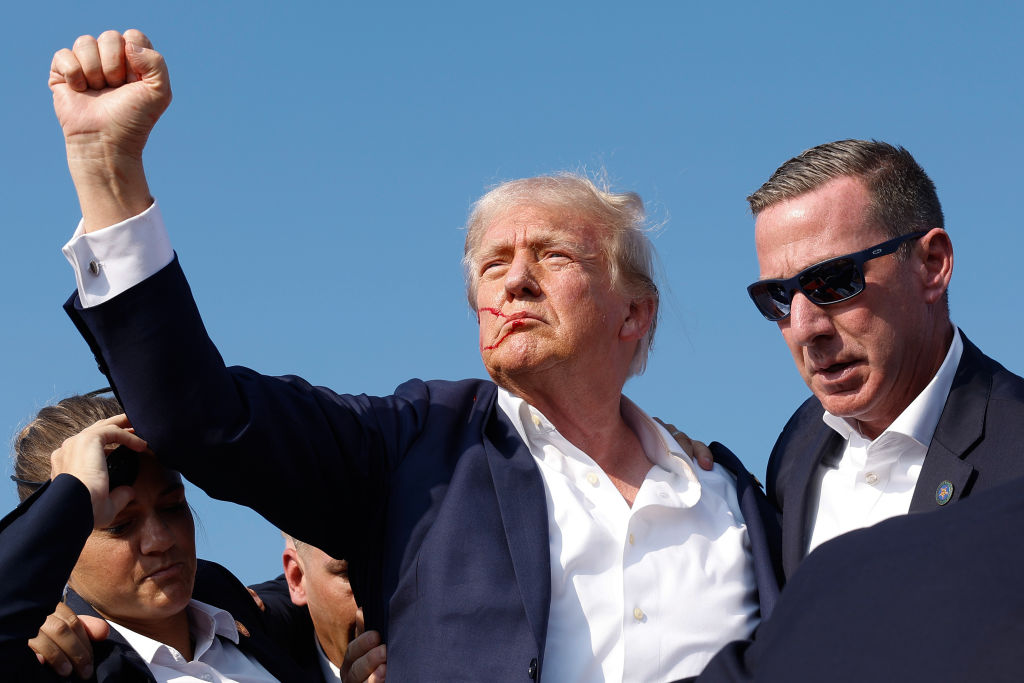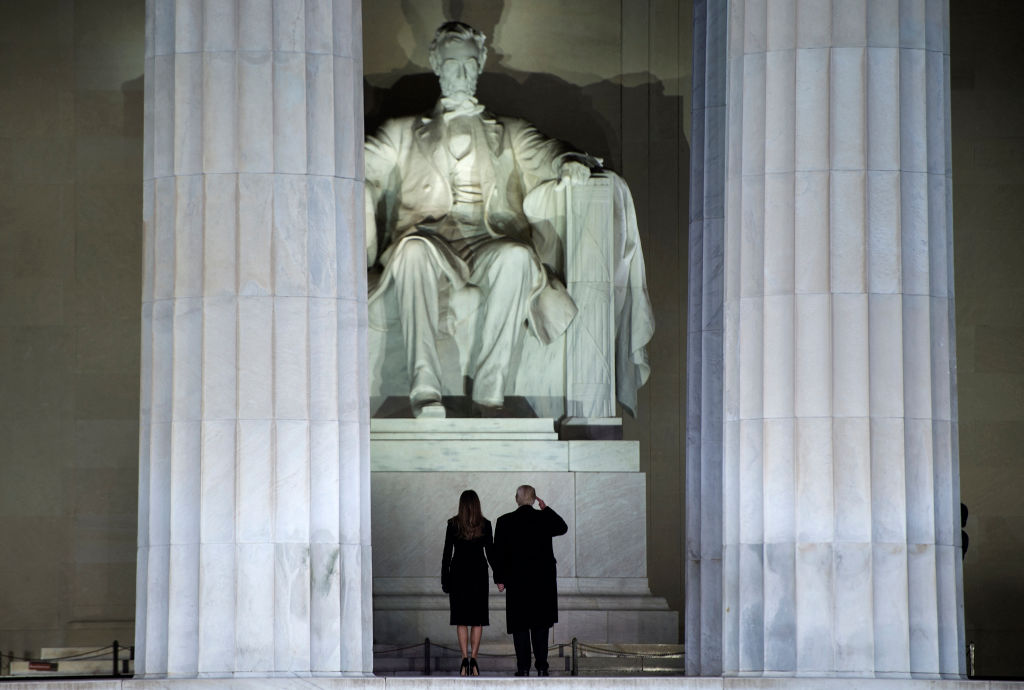To a growing crowd of irrationalists, the attempted assassination of Donald Trump is just another conspiracy theory.
Cometh the Hour, Cometh the Man

Trump’s defense of the self-evident truths of our Founding should give way to a Lincolnian reconciliation.
In 1865, Abraham Lincoln concluded his Second Inaugural Address with an appeal to mercy. “With malice toward none, with charity for all, with firmness in the right as God gives us to see the right,” the nation worked to bind up its wounds. Six weeks later, the Great Emancipator was killed by an assassin’s bullet, though he rose to immortality and became a world-historical figure.
Having ordered the great armies of the Union to battle, Lincoln knew that his country would maul itself in a great internecine conflagration. He endured as brother killed brother, as 600,000 of his countrymen succumbed to the ravages of war, as his political rivals undermined him, and as a vitriolic media spewed venom. Even before that fateful day in 1865, Lincoln survived earlier assassination attempts, including one from a sniper’s bullet that passed through his hat. Lincoln endured this and aimed for reconciliation, because he knew that greater principles were at stake. He was merely their embodiment.
Donald J. Trump is now the focal point on which a battle for America is being fought. He has become the embodiment of the principles of the Founding for many millions of Americans who still cherish those ideals. Arrayed against him and them are those who deny those principles, hate those who live by them, and wish to destroy the United States of America. They will do anything to win.
But even in the face of animosity and pending conflict, Trump’s rhetoric has shifted in tone to the prudential. He sees that after the struggle is won, there must be a reconciliation between Americans. His intuition is of great historical significance.
The Forces of History
The emergence of Donald Trump was contingent on forces that predate him, specifically a decades-long effort to overthrow Western civilization in general and the United States of America in particular. It consists of the Left’s subversion of our form of government, hijacking of our stable legal institutions, relentless criticism of our history, cynicism about our Founding principles, and erosion of our productive and stable social norms. The Left targeted these institutions because they stood in the way of their utopian scheming. Since these institutions were so robust, however, ordinary Americans were slow to realize they were under assault. Until 2016, most Americans had no real idea how late the hour was.
It was then that Donald Trump and the currents of history began to converge. As Lincoln’s debates with Stephen Douglas brought essential questions about America into stark relief, Trump’s 2016 election pulled the wool from many benighted eyes about the same types of questions. “Make America Great Again” and “America First” may not have been high rhetoric worthy of our 16th President, but they had the redeeming characteristic of raising some obvious questions: What is America, exactly? What does it mean to be great?
The Left has known their answers to those questions for a long time: They do not believe that all men are created equal. They mock God. They deny that we are endowed with certain unalienable rights. They scoff at the idea that the purpose of government is to secure those rights. And they govern with or without your consent. The Left also know that American institutions and the American people do believe those things. As such, the Left view them both as enemies of their grand schemes and set about destroying them. Most ordinary people had no idea they were under assault.
The Great Awakening
Donald Trump knows that we must fight if we wish to preserve the self-evident truths of our Founding. In 2016, he also understood that most Americans would defend them if only they saw that they were under assault. And so, thanks to Trump, ordinary Americans finally perceived the threat (2016), came to understand its severity and scope (2020), prepared to fight back (2024), and, with the assassination attempt, now realize it’s a winner-take-all contest.
Having recognized all this early on, Trump became the embodiment of our willingness to defend those self-evident truths. As such, it is not Trump that the Left hates, but the ideas he represents and the fact that Americans are willing to defend those ideas. By this I mean that Trump—even though he is not the president—now represents the only people in the long history of the Earth who are unified not by tribe, race, religion, or force, but by confidence in self-evident truths.
It may seem odd that a man who is not an elected official should represent so many Americans. But appearances are deceiving. As with Lincoln, Trump embodies an idea so that he may be elected, not the other way around. In this way, Trump understands that the people who have sought to destroy him really seek to destroy the United States of America. These people hate Trump because they hate the self-evident truths of our Founding. Your truths. This is summarized by Trump’s pithy observation: “They’re not after me, they’re after you. I’m just standing in their way.”
It is now apparent that the enemies of the United States of America know no limits in their willingness to destroy Trump. First, they tried to do it with lies, bombarding the country and the world with deceit so pervasive that nothing like it had ever been seen in the West. Next, they corrupted our form of government by subverting a national election to keep Trump from the presidency. Then, they hijacked the criminal and civil justice systems to prosecute him. And now, one of their foot soldiers tried to assassinate him.
As I said in a previous article, winning this contest will require that unpleasant things be done. People who subvert our form of government, who weaponize the criminal justice system, who prosecute their political enemies, and who incentivize (or worse) the assault or murder of their opponents must be held to account. This can be done within the letter of the law; but, still, examples must be made. It is not enough to assume that an election defeat will cause America’s internal enemies to give up. They must understand that we intend to restore the principles of the American Founding and that their lawlessness will not stand in our way.
Reconciliation
However, once that message is delivered, there is room for malice toward none and charity for all. Indeed, just as the struggle to restore the country is essential, so is reconciliation with those who are willing to see the error of their ways. Without it, there is no America.
As the Civil War came to its end, and power was reconsolidated in the national government, Lincoln was equipped to deliver an awful wrath upon those who had initiated the conflagration against him and against the United States of America. Ordinary men would act upon the confluence of power and justification to punish their enemies. Lincoln was different. The war, he understood, was fought to restore the grand ideas upon which the nation was founded, those embodied in the Declaration of Independence. At the conclusion of the war, those ideas–the greatest ideas–could only be saved by reconciliation.
Trump may face a similar conundrum. Many people on the Left have committed grave crimes against the nation and against Trump personally. If victory comes, he may have an awesome power to deliver retribution. A mere mortal would use that occasion to bring an unfathomable wrath upon his enemies. But, as with Lincoln, Trump is something more. Just hours after the attempt on his life, we saw this: “in this moment, it is more important than ever that we stand United, and show our True Character as Americans, remaining Strong and Determined, and not allowing Evil to Win.”
It is astonishing and ennobling that a man could rise to this lofty height in the face of such vituperative and personal hate. They defamed him, tried to destroy him professionally and politically, tried to bankrupt him, stole an election from him, tried to incarcerate him, and now have tried to murder him. Like Lincoln—perhaps more so—Trump has cause to take retribution. But, also like Lincoln, Trump understands that this struggle is not about him. Rather, it’s about the self-evident truths of our Founding. Restoring those principles requires the type of man who can do the unpleasant things and rise above the desire for personal vengeance, no matter how justified. It requires a man for the ages.
It is not for us to know how or when these ordeals for Trump and we Americans will end. We can only know, as Lincoln said, “that the judgments of the Lord are true and righteous altogether.” Altogether, as in “when all is said and done.” In the meantime, we can see that Trump’s character, while flawed, points beyond itself to nearly-extinguished ideals of patriotism, heroism, and sacrifice. The type of things that cannot be motivated by mere personal vanity or the desire for power. His character has given us time to orient ourselves to the enemy so that we may stand and defend those self-evident truths—and, after that, go about the business of reconciliation.
The American Mind presents a range of perspectives. Views are writers’ own and do not necessarily represent those of The Claremont Institute.
The American Mind is a publication of the Claremont Institute, a non-profit 501(c)(3) organization, dedicated to restoring the principles of the American Founding to their rightful, preeminent authority in our national life. Interested in supporting our work? Gifts to the Claremont Institute are tax-deductible.
Trump’s near-death experience gives him a second chance.
Donald Trump and America each dodged a bullet.
Under the Left’s doctrine of stochastic terrorism, the culprits for the assassination attempt range far and wide.
Now is the time to challenge anti-American extremism.





